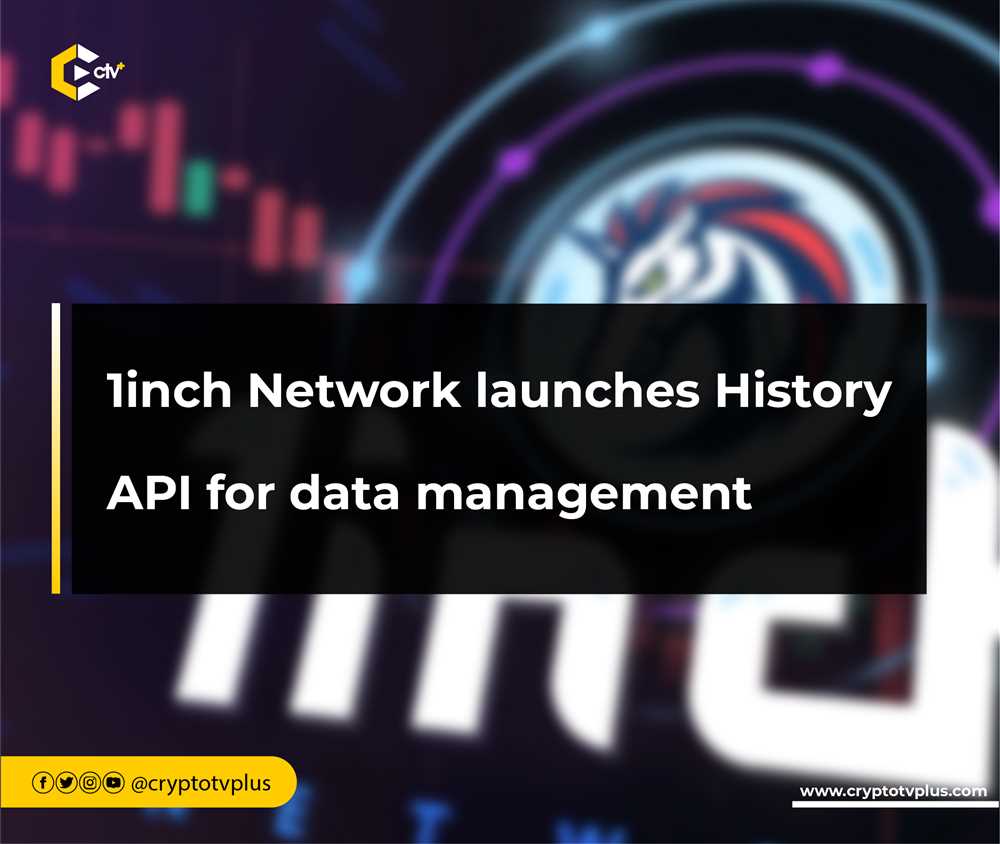The Significance of Privacy and Security in 1inch Finance: Ensuring Safe Transactions and Protecting User Data

In today’s digital age, where financial transactions are increasingly conducted online, the importance of privacy and security cannot be overstated. One platform that has taken a proactive approach in protecting user data is 1inch Finance.
1inch Finance is a decentralized exchange aggregator that allows users to access multiple decentralized exchanges (DEXs) with the best rates on the market. However, in order to provide this service, 1inch Finance needs to collect and store user data. This raises concerns about privacy and security, as the platform deals with sensitive financial information.
To address these concerns, 1inch Finance has implemented robust privacy and security measures. The platform uses encryption technology to protect user data from unauthorized access. Additionally, 1inch Finance follows best practices in data storage and has strict protocols in place to prevent data breaches. The platform also employs multi-factor authentication to ensure that only authorized individuals have access to user accounts.
Privacy is equally important to 1inch Finance. The platform is committed to maintaining user anonymity and does not collect personally identifiable information without consent. User data is anonymized and aggregated for analytical purposes, while individual identities are kept confidential. This approach ensures that users can trade on 1inch Finance without compromising their privacy.
By prioritizing privacy and security, 1inch Finance is setting the standard for cryptocurrency platforms. It not only protects user data from hackers and unauthorized access but also respects user privacy. In a world where online security threats are becoming increasingly sophisticated, 1inch Finance is ensuring that users can trade with confidence, knowing that their financial information is protected.
The Security Risks of Sharing Personal Information on Social Media

With the rise of social media platforms, people have become accustomed to sharing their personal information online. While this can be a great way to connect with others and stay updated on current events, it also exposes individuals to various security risks.
Theft of Personal Identity
One of the major dangers of sharing personal information on social media is the potential for identity theft. When users post their full names, birthdays, or even pictures of their driver’s licenses or passports, malicious actors can use this information to impersonate them or access their accounts. This can lead to financial loss, damaged reputation, and even legal trouble.
Targeted Cyberattacks
By sharing personal information on social media, users also provide cybercriminals with valuable data for targeted attacks. For instance, hackers can use location information to track a person’s whereabouts or craft convincing phishing emails by exploiting the mentioned personal details. Once again, this can result in financial loss, data breaches, and compromised digital security.
Therefore, it is crucial to be mindful of the information shared on social media platforms in order to prevent such security risks.
Protecting Personal Information on Social Media
There are several steps users can take to protect their personal information on social media platforms:
- Review Privacy Settings: Users should regularly review and adjust their privacy settings, making sure that only trusted contacts can access their personal information.
- Be Selective About Friends and Followers: It is important to be cautious when accepting friend or follower requests, as some accounts may have malicious intent.
- Avoid Sharing Sensitive Information: Users should avoid posting sensitive information like their home address, phone number, or financial details.
- Enable Two-Factor Authentication: Two-factor authentication adds an extra layer of security to social media accounts, making it harder for hackers to gain unauthorized access.
- Verify Apps and Links: Before clicking on any links or granting access to third-party applications, users should verify their authenticity to avoid falling victim to scams.
By following these precautions, individuals can significantly reduce the likelihood of falling victim to security risks associated with sharing personal information on social media.
The Dangers of Oversharing on Social Media Platforms
Social media platforms have become an integral part of our lives, allowing us to connect with friends, share personal moments, and express ourselves. However, it is essential to recognize the potential dangers and risks associated with oversharing on these platforms.
One of the most significant dangers of oversharing on social media is the threat to personal privacy and security. When we share too much information about ourselves, such as our location, daily routines, or personal details, we unknowingly expose ourselves to potential harm. Cybercriminals can easily collect this information and use it for identity theft, stalking, or other malicious activities.
Moreover, oversharing can have severe consequences for our professional lives. Employers and recruiters often browse social media profiles to gather information about candidates. If we overshare personal information or engage in inappropriate behavior online, it can negatively impact our job prospects and professional reputation.
Another danger of oversharing is the potential for online harassment and cyberbullying. By sharing personal experiences or opinions, we make ourselves vulnerable to abusive and hateful comments from strangers. This can have a significant impact on our mental health and overall well-being.
Additionally, oversharing can lead to opportunities for social engineering attacks. When we provide too much information about ourselves, such as our full name, date of birth, or other sensitive details, malicious individuals can use this information to manipulate or deceive us.
Lastly, oversharing can result in the loss of control over our own narratives. Once information is shared online, it becomes nearly impossible to completely erase it. Even if we delete a post or account, it may have already been saved, shared, or stored by others. This lack of control can have long-lasting consequences, as the information can resurface at any time and in any context.
To protect ourselves from the dangers of oversharing, it is crucial to exercise caution and be mindful of the information we share on social media platforms. We should regularly review our privacy settings, be selective about our connections, and think twice before posting anything personal or sensitive. By being aware of the potential risks, we can better protect our privacy, security, and overall well-being in the digital era.
Protecting Your Privacy and Security Online
Protecting your privacy and security online is more important than ever. With the increasing amount of sensitive information being shared and stored online, it is crucial to take steps to keep your personal data safe. Here are some important tips to help protect your privacy and security while using the internet:
Create Strong and Unique Passwords
One of the simplest yet effective ways to protect your privacy and security online is by creating strong and unique passwords for all your online accounts. Avoid using common passwords or easily guessable information such as birthdays or pet names. Instead, opt for a combination of uppercase and lowercase letters, numbers, and special characters.
Enable Two-Factor Authentication
Two-factor authentication adds an extra layer of security to your online accounts. When enabled, you will need to provide a second form of verification, such as a unique code sent to your phone or email, in addition to your password. This makes it much more difficult for hackers to gain access to your accounts.
Be Wary of Phishing Attempts

Phishing is a common online scam where hackers disguise themselves as trustworthy entities to trick you into revealing personal information, such as passwords or credit card details. Be cautious of emails or messages asking for sensitive information and double-check the legitimacy of the sender before providing any data.
Additionally, avoid clicking on suspicious links or downloading attachments from unknown sources, as they could contain malware or other harmful software.
Protecting your privacy and security online requires ongoing vigilance. By implementing these tips and staying informed about the latest security practices, you can help safeguard your personal data and ensure a safer online experience.
Best Practices for Securing Your Personal Information on Social Media
Social media platforms have become an integral part of our lives, allowing us to connect with friends, share experiences, and express ourselves. However, it is important to be aware of the potential risks that come with sharing personal information on these platforms. Here are some best practices for securing your personal information on social media:
1. Limit the amount of personal information you share
One of the easiest ways to protect your personal information on social media is to limit the amount of information you share. Avoid sharing sensitive data such as your full name, address, phone number, or personal identification numbers. Only share information that is necessary and relevant to your social media presence.
2. Adjust your privacy settings

Take advantage of the privacy settings provided by social media platforms. These settings allow you to control who can see your posts, your personal information, and who can contact you. Regularly review and update your privacy settings to ensure that they align with your comfort level and current preferences.
3. Be cautious about friend requests and connections

Be selective when accepting friend requests or connecting with other users on social media. Ensure that you know and trust the person before accepting their request. Be wary of accepting requests from strangers or accounts that seem suspicious.
4. Use strong and unique passwords
Using strong and unique passwords is crucial to protect your social media accounts from unauthorized access. Avoid using easily guessable passwords and consider using a password manager to generate and store strong passwords for your accounts.
5. Be mindful of what you post
Think before you post. Be cautious about sharing personal details, locations, or plans that could potentially be used against you. Remember that once something is posted online, it can be difficult to completely remove it from the internet.
6. Regularly review your account activity
Regularly review your social media account activity to spot any suspicious or unauthorized access. Check for any unfamiliar posts, messages, or changes in your account settings. If you notice anything suspicious, report it to the social media platform and take necessary actions to secure your account.
7. Educate yourself about privacy and security features
Stay informed about the privacy and security features offered by the social media platforms you use. Take the time to understand how these features work and utilize them to enhance the security of your personal information.
8. Be cautious about third-party apps and links

Avoid clicking on unknown or suspicious links, especially those shared by strangers. Be cautious about granting permissions to third-party apps that request access to your social media account information. Only install reputable apps from trusted sources.
| Do: | Don’t: |
|---|---|
| Regularly review and update your privacy settings | Share personal information such as your full name and address |
| Use strong and unique passwords | Accept friend requests from strangers |
| Think before you post | Click on unknown or suspicious links |
| Be cautious about third-party apps | Share your personal identification numbers |
By following these best practices, you can enhance the security of your personal information on social media and minimize the risks associated with sharing personal data online.
Question-answer:
What is 1inch Finance?
1inch Finance is a decentralized exchange aggregator that operates on the Ethereum blockchain. It allows users to find the best prices for swapping tokens across various decentralized exchanges.
Why is privacy important on 1inch Finance?
Privacy is important on 1inch Finance because it ensures that users’ personal and financial information is kept secure. Without privacy, there is a risk of unauthorized access to sensitive data, which can lead to identity theft and financial loss.
How does 1inch Finance ensure privacy and security?
1inch Finance ensures privacy and security through the use of advanced encryption techniques and secure protocols. It employs smart contracts and distributed ledger technology to protect user data and transactions. Additionally, users have the option to use wallets that provide enhanced privacy features.
Can 1inch Finance be hacked?
While no system is completely immune to hacking, 1inch Finance has implemented robust security measures to minimize the risk of unauthorized access. It continuously monitors and updates its security protocols to stay ahead of potential vulnerabilities. However, it is always important for users to take their own precautions, such as using strong passwords and keeping their wallets secure.
What are the benefits of using 1inch Finance in terms of privacy and security?
Using 1inch Finance provides users with several benefits in terms of privacy and security. Firstly, it allows users to maintain their financial privacy by not requiring them to provide personal information during transactions. Additionally, it uses secure protocols and encryption techniques to protect user data and funds. Moreover, it helps users find the best prices for token swaps without the need for multiple transactions, reducing the risk of exposure of sensitive information.